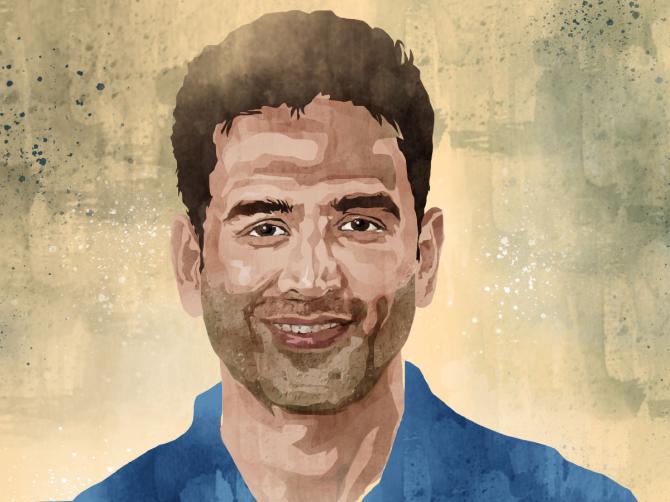'In the business of money, where you are regulated, the liability lies on the head of the acquirer.'
'It is not a good thing when you cannot spot the risks.'

One consequence of the funding rush in the past year has been that fintech start-ups are acquiring licensed financial services companies -- BharatPe, along with Centrum, bought PMC bank, Groww acquired Indiabulls' MF business and Cred has acquired NBFC Parfait Finance.
But fintech unicorn Zerodha, which saw its best month yet in November as close to 400,000 customer additions took its total user base to 7.6 million, does not plan to acquire any legacy business although it is planning to come up with mutual fund and NPS products.
Nithin Kamath, founder and CEO of Zerodha, tells Deepsekhar Choudhury why the company doesn't take the risky road of acquiring businesses for proxy licences, start-ups not making enough disclosures in IPO documents and quarterly results and more.
Fintech unicorns like BharatPe, Groww, Cred are acquiring legacy financial services companies. Why are you the outlier?
Today, when you look at the acquisitions in fintech, it is not for customers but for license.
We are very wary about technical debt, legacy issues and risks that get hidden in the books.
For us, there is no hurry to grow fast. The risks far outweigh the slightly faster time we can go to market if we make an acquisition.
In the business of money, where you are regulated, the liability lies on the head of the acquirer.
It is not a good thing when you cannot spot the risks.
We could have gone ahead and bought an AMC, but an existing team and legacy issues would have come with it.
Whatever little experience I have of building Zerodha till now, it is always good to begin with a clean slate.
The endgame of all fintech firms seems to be disbursing loans. Do you have any such plans?
The reason fintech companies are forced to look at lending is because, today, they are spending so much money to acquire a customer.
There is so much competition in fintech that there is no pricing power and then they pluck the lowest hanging fruit of lending.
In India, with all the VC money coming in, people have shifted focus from their core products and are giving cashbacks and goodies to acquire consumers.
Now, if I spend Rs 3,000 on acquiring a customer and earn only Rs 200 from them, I have to do something to recover another Rs 2,800, right? That is what is pushing everybody into the lending business.
Do you think the huge amount of VC funding coming in will unsettle those trying to build a sustainable business?
If I were to build Zerodha today, I could not do it in the way I did.
We were lucky that we were already a decent size and earning well by the time this funding rush started.
I don't know why everyone ends up celebrating all the unicorns and all the money raised.
It does not do anything good for the industry or the consumer.
It is building wrong expectations for the customer: we charge an account opening fee of Rs 200 and many users drop off there and they ask why do you charge an account opening fee.
There is a cost to open an account like e-signatures and eKYCs.
VCs and tech founders say that their businesses should not be valued on the basis of the traditional earnings metrics.
But those that are going public are not sharing enough data on users and usage, too. Is there a problem?
It is fair if they say that metrics like P/E are a bit outdated for tech businesses and they should be valued on user growth and their branding.
But then you have to give granular data about your user base comparable to the audited financial statements.
There is an obligation to reveal all those things to your investors on a quarterly basis.
Also, I am not sure that a company which does not have a resilient business model should be allowed to come to the public markets.
At this point, it is only the top few companies that are going public and that might still be okay.
But what happens when the numbers 4 and 5 businesses come? Many of these companies are going to disappear when they are not able to raise any more funds.
What is your diagnosis of what went wrong with Paytm's flop listing?
The thing is when your business is built on a certain narrative, a private market investor will not go and challenge that with a public statement.
But when you go to the public markets, people may not buy your story and form a counter narrative.
You have to keep feeding the market with some news about user numbers or other things for that narrative to sustain.
Otherwise, the valuations will taper off. For Paytm, it happened on the first day.
Other similar tech businesses going for an IPO could see it happen over six months, one year or two years.
You seem to be opposed to investing in crypto. What would you tell yourself if 30 years down the line the most lauded investors and founders are crypto people?
I have zero crypto exposure. The only thing you can miss out on in crypto is missing out on making a lot of money and I don't think that will bother me so much.
Many years back, one of the largest crypto holders of the world had given me a physical replica of a bitcoin.
Somehow, I even misplaced that while we were relocating our office.
I have said no to several crypto exchanges who came to Rainmatter, our fintech fund, and said we will give you a stake even if you are just an advisor and don't invest money.
Why would a developer put out a crypto token whose value is ten or hundred thousandth of a dollar? The only reason you would do it is akin to getting on penny stocks.
You are essentially inducing people to believe that $0.0007 can easily become $1.
They are not saying it as such, but that is what it is.
A lot of invest-tech platforms are getting heavily funded while you remain bootstrapped.
Is there a need on the part of the regulator to ensure that ease of investing does not translate to a user giving into their worst instincts?
I think Sebi has been doing a phenomenal job in terms of regulations when it comes to savings and investments products.
The Indian broking industry by far is the safest for a retail investor anywhere in the world.
I don't think any market even comes close to us in terms of investor security.
What do you think about influencers talking about investments online albeit with a minor disclaimer that it is not a recommendation?
It is a very tough problem to solve and I know the regulator is worried about it.
One way could be following the bank account trail of influencers who are teaching people to trade online, charging a lot of money, earning from YouTube ads.
I don't think we can stop people from putting up a video or blog expressing their views on the financial markets.
China, apparently, has put out a diktat to say people cannot flaunt their wealth online to stop such a menace.
But I am not sure we can take such an extreme step here.
Feature Presentation: Aslam Hunani/Rediff.com











